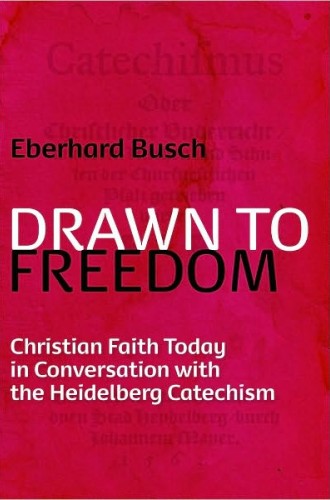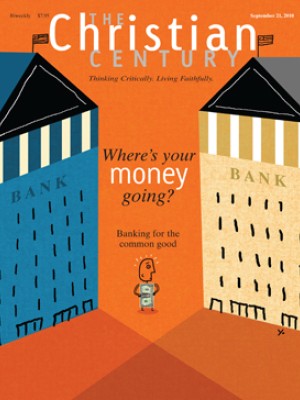A review of Drawn to Freedom
It is a most happy memory that when the Berlin Wall fell in 1989, Leonard Bernstein was there to celebrate with Beethoven's Ninth Symphony. It will be remembered that when the great chorus sang Beethoven's "Ode to Joy," it did not voice the familiar "Freude, Freude" ("joy, joy") but instead changed the words to "Freiheit, Freiheit" ("freedom, freedom").
In the shadow of the fallen wall, freedom was the compelling theme. In light of the unexpected, almost inexplicable emancipation from barbaric wounding by the East German government, there was so much to celebrate, and everyone understood the new phrasing.
Read our latest issue or browse back issues.
That simple, direct, unambiguous moment, however, is not the norm for thinking about freedom. For the most part, freedom is a deeply problematic notion, about which Richard Bauckham weighed in with his 2002 book God and the Crisis of Freedom. Bauckham's discussion and Drawn to Freedom by Eberhard Busch consider the contest (or contradiction) between notions of Enlightenment autonomy and covenantal commitment, both of which invoke the banner of freedom.
Busch, a Reformed theologian retired from Göttingen, is best known for his work as an assistant to Karl Barth and as Barth's definitive biographer. Indeed, he continues to probe Barth's bold life, most recently examining the theologian's pressure on the Swiss government to desist from its collusion with Hitler. While the present volume has Barth's fingerprints all over it, the book exhibits Busch's own deep theological sensibility and his capacity to voice the gospel in rich and thick contemporary tones.
Busch takes up the vexed Western question of freedom and continues with a profound critique of Enlightenment notions of autonomy that turn out to be spiritual and cultural dead ends. He does so, however, from a peculiar and compelling angle: a rereading of the Heidelberg Catechism.
The Heidelberg Catechism is itself a marvel. Published in 1563 by two younger theologians in Heidelberg, it offered an ecumenical statement of Reformation faith in an effort to encourage and preserve theological unity among Reformers, who were tempted to peculiar extremities in interpretation. In an almost lyrical rendering, the catechism voiced the common ground of the Reformers without probing idiosyncratic themes. It made room for the accents of Calvin, Luther, Bucer, Bullinger, Melanchthon and Beza, the principals of the time. The publishers' goal was to make peaceful coexistence possible among the major Reformers. It is a sad misfortune that the catechism was not accepted by the more "orthodox" among the Lutherans, a feature of German theology that has vexed Busch in his own academic career.
The catechism is laid out according to the three great themes of evangelical faith: human misery, divine liberation and responsive gratitude. That in itself makes for a rich interpretive menu. But Busch stays relentlessly focused on the idea of freedom, insisting that the only genuine freedom is that of a life lived with reference to God, the source of all freedom.
By contrast, the self-contained autonomy of modern freedom, the lust for self-independence, and the derivative move to the liberal economy of individualism cannot keep their promises of providing well-being. The Heidelberg Catechism becomes for Busch a lyric of true freedom for our society, which is presently on a path to burdensome unfreedom in its anxiety and in its endless requirement for more production.
The book is ordered in three long chapters. The first, with a thematic echo of Barth, concerns God's deliverance of the captives. It elegantly expounds on the awesome first answer of the catechism, which says that the core truth of creaturely life is that we belong to God—or, as it is written, "I belong . . . not to myself, but to my faithful Savior, Jesus Christ." This belonging to God is all-defining and has as its counterpoint that God, in God's freedom, is committed to belonging to us. This mutual belonging is not one of possessiveness by either party but is a mutuality of covenantal trust and commitment.
The second chapter concerns the freedom of God, who—unlike the remote, fixed God of philosophy and of popular religion—"comes for relationship" with us and brings us into relationship—that is, into membership as Christians. Here Busch pauses to reflect on the sacraments and insists that they are not of themselves transformative acts; they are signs and proclamations of what God is willing to do and does do to create new persons in relationship. Busch's understanding of the sacraments resists all the temptations to magical performance and the power of performing clergy and, in the end, returns to Barth's resistance to infant baptism: "Then the practice of infant baptism cannot be justified, and adherence of the Reformers to this practice was inconsistent." The sacrament as a sign of God's gift of new life is congruent with Calvin's resistance to anything that qualified the free action of God toward us.
In this exposition of God's freedom, the accent is placed on God's providential governance grounded in God's utter fidelity: nothing can keep God from being God and from being faithful toward us. The stress on God's present, self-willed graciousness is uncompromised in contrast to all the requirements of merit or production that turn up in Enlightenment notions of freedom as self-serving self-justification. Being justified, one need no longer justify oneself by one's performance.
The third long chapter is a commensurate discussion of the freed human being, with echoes of Luther's "Treatise on Christian Liberty." Here the accent is on thankfulness: responsive engagement with God's goodness that culminates in prayer, for prayer is "the most important aspect of the gratitude that God requires of us."
The outcome of this exposition is a bold, compelling portrayal of an alternative existence in the world that in every dimension challenges common assumptions of modern autonomy, assumptions that issue in anxiety, greed and eventually violence. That we are empowered to relationship, that we fall back on God's providence, that prayers of gratitude constitute maturity—all of this is a healthy alternative to the self-devouring anxiety required and fostered by the assumed truth of our society.
I have a conversation partner, a liberal, rational Christian, who regards with dismissive contempt "smart guys doing theology" who "have never done any good for anyone." His reference, in his ignorance, is to Barth in particular and the neoorthodox in general. Well, Busch is a "smart guy doing theology." This is a weighty, closely reasoned argument that requires hard work. The reason to pay attention to this smart guy is that he shows how the Christian gospel is an alternative to the assumed truth of modernist society.
When we dumb things down and cease to think critically, when we forget the tradition, when we soften the gospel claims that are not palatable to our society, when we cannot distinguish between autonomy and covenantal freedom, the nerve and edge of the gospel truth disappears.
I have no doubt that in a time near to come, the church will be challenged to recover its nerve, and Busch's work will be a critical resource for rethinking and redeciding. His reasoning is permeated by his piety, evident in his many references to the great hymns of the church. In a society that wants to reduce great faithful lyrics to mundane mantras, such daring faith can only be sung. For that reason Busch says that for the community called out by God, "praising God is already its calling." Imagine, doxology as bold contradiction!






